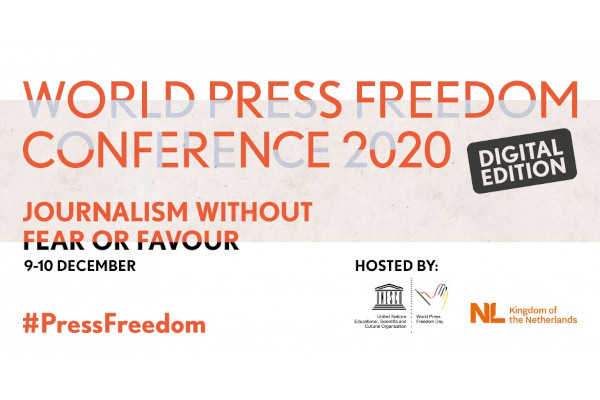back
Joint Statement on press freedom on the Occasion of the World Press Freedom Conference*

From 9-10 December the World Press Freedom Conference will take place, organized by UNESCO and the Kingdom of The Netherlands. The conference is organized in an innovative format, merging digital and in-person elements, and celebrates World Press Freedom Day (3 May) and the International Day to End Impunity for Crimes against Journalists (2 November).
On the occasion of this Conference, the undersigned reiterate their conviction that independent media play a crucial role in any democratic society, providing important checks and balances on governments and others in positions of power and authority.
Article 19 of the Universal Declaration of Human Rights guarantees the right to freedom of opinion and expression, including the right to seek, receive and impart information and ideas through any media and regardless of frontiers. Building on this, the 1991 Windhoek Declaration for the Development of a Free, Independent and Pluralistic Press recognised that press freedom required not only a legal framework that protects freedom of expression, but also conditions conducive to media pluralism and editorial independence.
In support of press freedom, the governments of the UK and Canada created the Media Freedom Coalition, hosting its first Conference in 2019. More than 40 countries have joined the Coalition so far. The Coalition aims to speak out when media freedom is curtailed, support journalists on the frontline, and promote financial sustainability of independent media. In addition to this, the International Partnership on Information and Democracy was launched and has been signed by 38 countries, to promote press freedom, freedom of expression and the access to reliable information, which are cornerstones of democracy.
In its 2020 World Press Freedom Report Reporters Without Borders ranked Moldova 91st on the Global Press Freedom Index. Moldova’s ranking has dropped significantly over the past seven years – in 2013 it was 55th – indicating a significant move in the wrong direction. The Report characterises Moldova’s media as diverse but extremely polarised, with the editorial lines of the leading media outlets correlating closely to the political and business interests of their owners. Intrusive, politically motivated ownership limits journalists’ ability to produce balanced and impartial reporting.
Whilst it is the prime responsibility of the Moldovan government and parliament to improve press freedom in Moldova, we would like to emphasize the need to provide citizens with fair, objective and honest reporting of news and current affairs without foreign interference and without being influenced by vested interests.
We stand ready to work with the government of the Republic of Moldova, the media sector, and civil society to support media freedom. We take this opportunity to commend all actors in Moldova who strive to enhance the media´s role in strengthening peace, stability and human rights. Finally, we express our respect for, and our solidarity with, the courageous journalists who go about their work with professionalism and integrity day in day out, in Moldova and across the world.
* The joint statement is issued by the missions of Austria, Belgium, Bulgaria, Canada, Croatia, Czech Republic, Denmark, Germany, Estonia, Finland, France, Ireland, Italy, Latvia, Lithuania, the Netherlands, Norway, Poland, Romania, Slovak Republic, Slovenia, Sweden, Switzerland, the United Kingdom and the United States to the Republic of Moldova.